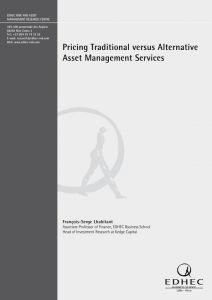

Pricing Traditional versus Alternative Asset Management Services
The delegation of asset management services is a source of potential agency problems between investors and their portfolio managers. Most of these problems can be avoided by using an adequate compensation theme. While the academic literature tends to be somewhat inconclusive as to whether or not, and to what degree optimal compensation should be linked to relative or absolute performance, industry practice seems to show a clear pattern: mutual funds charge an asset-based fee, while hedge funds charge both an asset-based fee and a performance fee. In this article, the author discusses the advantages and drawbacks of both types of fees. A revisited version of this paper was published in The Journal of Financial Transformation.
Author(s):
Summary:
The delegation of asset management services is a source of potential agency problems between investors and their portfolio managers. Most of these problems can be avoided by using an adequate compensation theme. While the academic literature tends to be somewhat inconclusive as to whether or not, and to what degree optimal compensation should be linked to relative or absolute performance, industry practice seems to show a clear pattern: mutual funds charge an asset-based fee, while hedge funds charge both an asset-based fee and a performance fee. In this article, the author discusses the advantages and drawbacks of both types of fees. A revisited version of this paper was published in The Journal of Financial Transformation.
Register to download PDF
Register/Log in| Type : | Working paper |
|---|---|
| Date : | 04/04/2005 |
| Keywords : |
Alternative Investments |

